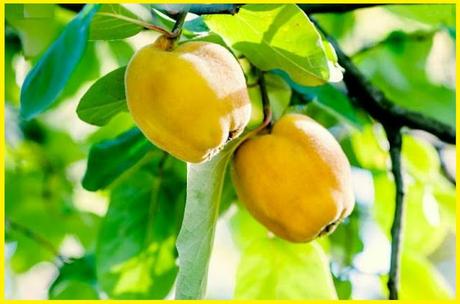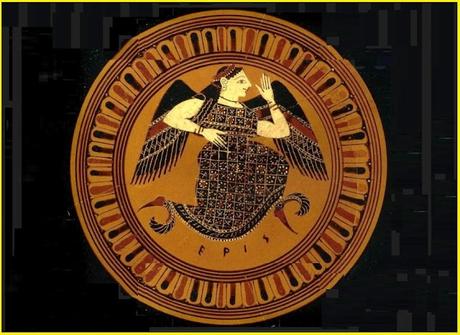My fellow blogger Terry Quinn has already given the low-down on the provenance of a fruit that seems to have fallen from favour since Victorian times. Check his excellent Quince post for details if you've not already done so. He also mentioned its possible starring role in the Greek tale of the Judgement of Paris and I'm going to reflect further on that myth below and in my latest poem.First though, a bit more information about the quince, because really it is not very common, we don't see it in our greengrocers' shops or supermarkets, and I'm sure most of us are not familiar with it except maybe as a jam.

Quince(s)
The deciduous tree that fruits it has the Latin name Cydonia Oblonga and it's a member of the rose family. The quince pome is bright golden-yellow (as above), looking like a misshapen cross between an apple and a pear, but even when ripe it is hard and tart, so is seldom eaten raw. Quince experts say this is a defence mechanism designed to prevent it being munched by marauding birds and insects; which is strange because having their seed-bearing fruit become tasty and getting munched is how most fruit trees manage to propagate themselves. However, when it is cooked, the quince becomes a different proposition entirely.It is still popular in the region from which it originated (Mesopotamia) and two-thirds of the world's annual tonnage of quince fruit is produced by Turkiye, Uzbekistan, Iran, and Azerbaijan. Morocco, Spain and Algeria also grow quinces in significant quantities. And what they do with them is cook them, which transforms the hard, yellow, grainy and bitter flesh into something quite wonderful, tender, aromatic and frequently deep red. The science that makes this culinary alchemy possible has to do with the fruit's phenolic compounds (anthroxanthins and anthrocyanins bound up in tannin molecules), which make it taste unappetising raw but are water-soluble. They react to water and heat (and a drop of lemon juice) in the cooking process by changing both colour, consistency and taste, becoming soft, deliciously tasty, ruby-red slices fit for a feast; or if processed further, into a jam or jelly (because of the high pectin quotient) or into a sweet paste worthy of any tea table or cheeseboard .
It is not certain that it was a Golden Quince that featured in the Greek tale of the Judgement of Paris. It may have been an apple, apricot, costard, medlar, peach, pear, persimmon or pomegranate. But for the sake of continuity of theme, let's stick with the quince theory because the tart nature of the fruit fits the narrative well.
Eris, Goddess of Discord, was the prime-mover in the tale. Zeus had decided to throw a jubilee of sorts, a banquet on Olympus in celebration of the marriage of Peleus and Thetis (who became the parents of Achilles) but chose not to invite Eris to the feast, for she was bound to cause nothing but trouble.

Eris the uninvited
Eris turned up anyway, annoyed by the snub, and true to her nature proceeded to cause precisely the trouble Zeus had been hoping to avoid by bringing with her a Golden Quince inscribed with the word ÎşÎąÎťÎťÎŻĎƒĎ„áżƒ (kallistei): "for the fairest one". Three goddesses at the banquet, Hera (wife of Zeus and Goddess of Family), Aphrodite (Goddess of Sexuality) and Athena (Goddess of Wisdom and Warfare) all claimed they were deserving of the trophy and so asked Zeus to arbitrate. Being a wily God and to avoid offending any of the three, Zeus dodged a bullet and decreed that Paris, a mortal and son of King Priam of Troy, should be the one to decide which of the three was most worthy of the Golden Quince. Eris was left sneering all the way to the Trojan War. Read it recast here, the latest work-in-progress...The Queens & The QuinceSour as discord is, Eris blows in acrid from Hesperidesbearing a graven golden quince marked kallistei -for the fairest. Tart jealousy tricked out in proud disdainconcealing a howling heart, she drops her trophylike a glittering grenade. Her part in this drama played,the Queen of Disharmony steps back into shadowto enjoy seeing heaven's equilibrium rent apart by pride blent with bright-eyed greed. The three she enviesmost cajole their host to name them each deserving justsuch an accolade. Eris wills her fellow Queens toscrap like cats can, and though they won't fall out, Zeushas no doubt that they could make his life difficultif he names one fairer than the rest so he avoids the testby appointing mortal Paris adjudicator of the fairest.Eris thwarted spirits off in splenetic haste to plot a twistthat will wreak havoc for this upstart human princeand a decade of destruction upon the entire earthly race.

And the winner is....
Aphrodite of course was able to claim the Golden Quince (or apple, apricot, costard, medlar, peach pear, persimmon, pomegranate) Of Discord when Paris declared the Goddess of Sexuality fairest of deities, in return for her gifting him the most beautiful of human equivalents; (just a shame Helen of Sparta was already married).Amor vincit omnia as they say.đŸ�‘Thanks for reading. Stay fair, S ;-) Email ThisBlogThis!Share to TwitterShare to Facebook